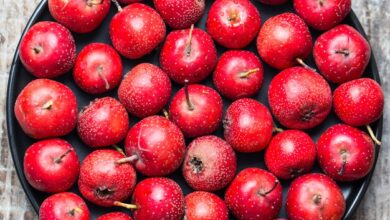The Elephant Apple: A Unique Fruit with Many Benefits

Introduction: The elephant apple, known for its distinct flavor and health benefits, is a tropical fruit that often flies under the radar despite its impressive qualities. Native to Southeast Asia, this intriguing fruit is gaining popularity for its potential uses in both culinary and medicinal applications. From its rich nutritional profile to its diverse uses in traditional medicine, the elephant apple is a hidden gem that deserves more attention. In this article, we will explore various aspects of this fascinating fruit.
1. What is an Elephant Apple?
The elephant apple, scientifically known as Dillenia indica, is a tropical fruit native to Southeast Asia. Often found in regions like India, Bangladesh, and parts of Myanmar, it is a large, round fruit with a tough, green skin. The fruit’s flesh is mildly sweet and sour, and it is sometimes referred to as the “wood apple” or “chulta fruit.” Despite its name, the elephant apple is not related to the apple family, but it has a similar size and shape, which is likely where the comparison stems from.
2. The Nutritional Value of Elephant Apple
Elephant apples are packed with essential nutrients and antioxidants. They are a good source of dietary fiber, vitamin C, and other vitamins and minerals that contribute to overall health. Their high fiber content aids digestion, while the vitamin C helps boost immunity and promotes healthy skin. The fruit is low in calories, making it an excellent option for those seeking a nutritious and light snack.
3. Culinary Uses of Elephant Apple
While the elephant apple may not be as commonly found in Western supermarkets, it plays an important role in Southeast Asian cuisines. The fruit can be eaten raw, cooked, or used in beverages. Its sour taste makes it a popular ingredient in chutneys, curries, and sauces, where it adds a tangy depth of flavor. The seeds are often discarded, but the pulp is utilized for its tartness in many dishes. In some regions, it is also used to make fermented drinks.
4. Health Benefits of Elephant Apple
The elephant apple is renowned for its medicinal properties. Traditionally, the fruit has been used in Ayurvedic medicine to treat a variety of ailments, including digestive issues, inflammation, and respiratory problems. The antioxidants found in the fruit are believed to reduce the risk of chronic diseases, and the fruit’s anti-inflammatory properties can help reduce pain and swelling. Additionally, elephant apples are known for their ability to improve gut health due to their high fiber content.
5. Elephant Apple in Traditional Medicine
In addition to its culinary uses, the elephant apple has been an important part of traditional healing practices. Its leaves, bark, and fruits are used in various parts of Southeast Asia to prepare remedies for stomach ailments, skin conditions, and even fever. The fruit is considered an effective natural remedy for constipation and can help improve digestive health. The pulp of the fruit has been used to treat skin irritation and wounds as well.
6. Environmental and Economic Importance

Beyond its health benefits, the elephant apple is also an important plant for local economies and ecosystems. It grows in forests and other natural habitats, contributing to biodiversity. In some areas, it is cultivated for both local consumption and trade, providing income for farmers. The tree’s ability to thrive in challenging environments, such as wetlands, also makes it an important part of the ecosystem, helping prevent soil erosion.
7. Challenges in Cultivation and Availability
While the elephant apple has many benefits, there are challenges to its widespread cultivation and availability. Its cultivation is limited to specific tropical regions, and the fruit may not be available in markets outside of Southeast Asia. Moreover, the tree takes several years to mature and bear fruit, which may hinder large-scale commercial farming. Efforts are underway to promote its cultivation in other tropical regions to increase availability.
8. Conclusion: A Fruit Worth Discovering
Whether enjoyed fresh, used in dishes, or incorporated into medicinal practices, the is a fruit worth discovering.



